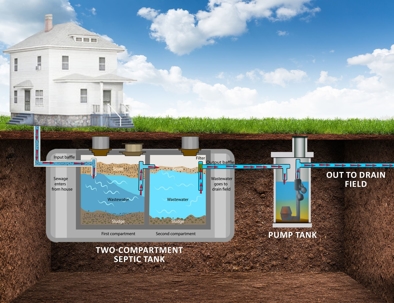If you’ve ever experienced your septic tank alarm going off, it can be very uncomfortable and even cause some panic. Don’t worry, it is doing what it was designed to do by warning you while you have time to do something about it. There is no reason to freak out, so take your time to read this whole article so you know how to properly handle the situation.
Why is My Septic Tank Alarm Going Off?
The alarm monitors the septic system to warn you when the water level within the tank where it is installed has risen too high or has dropped too low. There are many types of tanks, and which type you have will determine why your alarm is going off. Some septic systems alarms sound if the level in the main tank gets too high (like in a tight tank system), and others are designed to alarm if the water level is reaching a level that may damage other components of your septic system like a pump.
All septic systems with pumps will normally have some sort of timer installed to manage intervals when the pump will pump wastewater into the drain field. The system works at key times during the day to protect the drain field from becoming potentially harmed in times of higher water levels.
When Does an Active Septic Alarm Mean There’s a Problem?
If a lot of water is being introduced into the system and the pump is not keeping up with the increased volume of water, the water will rise to a level to sound the septic pump alarm. In systems with a pump in a separate tank, water will have no place to go besides the pump tank. Consequently, the water level will rise inside the pump tank until the timer allows for the pump to come back on. Since the timer only has the pump come on for certain times, it may take several pumping cycles before the water is pumped back down to normal levels. It depends on how much water was and continues to be introduced into the system, as well as the design of the system, to know how long the septic high water alarm will sound.
Potential Causes for a Septic Alarm to Go Off
Reason #1: Too much water is being introduced into the septic system
Overuse
Sometimes this can be related to too much water usage due to more visitors using your home system, several loads of laundry, an abnormal amount of dishwashing, or maybe a lot of long showers.
Groundwater
If too much standing water (caused by rain, flooding, or even pipes bursting) accumulates around the septic tanks, the water can potentially get into the tanks and cause the internal water level to rise.
Failure or Damage
There may be a problem with one of the septic system’s components. Anything, including the pump, floats, alarm, and timer, could possibly be faulty and cause the septic system to not work properly.
Reason #2: Water level in your septic system's pump tank is too low
Pump Malfunctions
Many septic systems utilize pumps to move wastewater from the pump tank to other parts of the system, such as a drain field or treatment area. If the water level in the pump tank drops too low, the pump might start sucking in air instead of water. This can cause the pump to run dry, leading to overheating and potential damage to the pump motor.
Improper Maintenance
Low water levels in the pump tank can potentially result from a lack of routine maintenance. Have your system periodically inspected by a professional to ensure that water levels remain consistent.
Septic Tank Leaks
A low water level may be the result of a leak in your septic tank caused by a crack, tank corrosion, a damaged tank baffle, or another cause.
What to Do if Your Septic Alarm Goes Off
First, turn off the alarm
Next, check the septic breaker to ensure the system has power
If the breaker happens to be on:
If the red light is still on after a couple of hours:
What to Expect with an Emergency Septic Service
Pumping Service
You will need to get the levels in your system down low enough for the professional to evaluate the system. This will involve a pumping to remove material from your tank, but will not necessarily resolve the issue if the cause is due to a failure or clog.
System Evaluation
Once the components of your system are accessible, a professional will evaluate the system to determine the cause and propose a way to fix the problem. It may not be the same person or even the same day as the pumping service, so please limit your water usage after the pumping until the plan has been agreed upon to fix any issues
Possible Schedule Interruptions
Just like you may be experiencing an emergency, there are also others who are in the same situation. We want to make sure everyone else is also safe from the immediate risk of backup and health/property dangers associated with a backup. We will do everything in our power to stay on schedule, but if a dire emergency comes up as we are trying to pump or evaluate your system, we also may ask for flexibility from you to get those who are in more danger to a safe place as well. We will make every effort to stay in communication with you about these possible changes, so make sure your contact data with us is correct.





